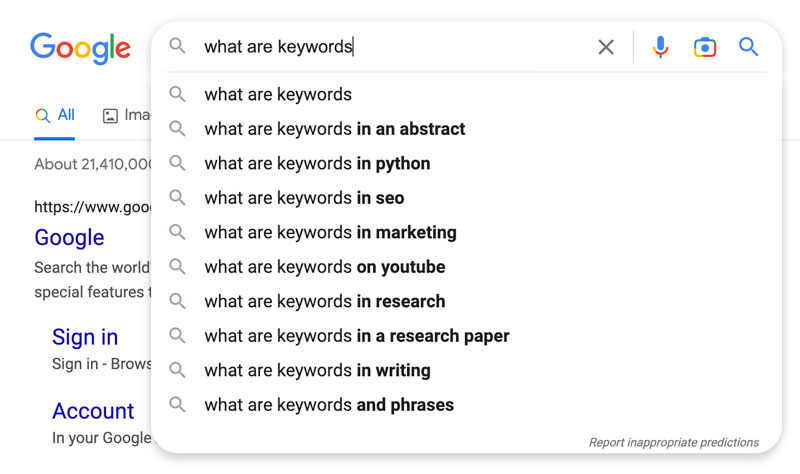A keyword is a single word or phrase used when searching for something online. It helps define the idea or topic for the content you seek so the most relevant matches appear in your search. Website content is created with specific keywords to be easily found and drive traffic to the site, boosting the ranking on search engine result pages.
You want to rank on search pages because that is how people find your content among the results. High ranking on search pages can translate to profit because it brings more people to your site.
How Do Keywords Work?
 Keywords work by driving traffic to your page that will result in conversions for your business. By boiling down your content topic to just a few keywords, you can bring a targeted audience who know exactly what they are looking for to your page. Using more general keywords can yield higher search results, but that may not result in higher conversions (people choosing your content from the list). For example, you may choose “fencing” as a keyword and get a high ranking – but either a sports enthusiast or someone seeking to enclose their yard may be disappointed in the results.
Keywords work by driving traffic to your page that will result in conversions for your business. By boiling down your content topic to just a few keywords, you can bring a targeted audience who know exactly what they are looking for to your page. Using more general keywords can yield higher search results, but that may not result in higher conversions (people choosing your content from the list). For example, you may choose “fencing” as a keyword and get a high ranking – but either a sports enthusiast or someone seeking to enclose their yard may be disappointed in the results.
How Do I Create a Keyword?
Your keywords will naturally occur from the content of your site. They will be a specific item, concept, or service being promoted on your site. Keyword phrases are often built with three parts:
- Head (subject)
- Modifier (description)
- Tail (specific detail)
For example, “fencing wood near me” is a keyword phrase that would yield more specific results than just “fencing.” By including a head, modifier, and tail, you have increased your chances of ranking higher in a more specialized search (wood, near me) rather than being in the endless results for an over-general search on “fencing.”
Where are Keywords Used?
Keywords should appear in your page’s title, the body of the content, any headers, and photo or image descriptions (also called alt-text). The use of keywords should naturally flow in the content of your site. Using too many can detract from the information you are attempting to provide and become a turn-off for the reader. Keywords should also accurately reflect the content of a page – “clickbait,” or enticing a reader with false or vague titles will water down the value of your site.

How Do I Choose Keywords?
It may be tempting to choose single words that reflect your site’s content; however, focusing on one specific word might yield too many results, leaving your site with a low ranking. For example, choosing “clothes” or “boutique” might leave you battling large retailers for ranking in the search engine results pages. Utilizing a long-tail keyword will more clearly define your content and offer specific information, reducing frustration for the individual searching.
Examples of long-tail keywords include:
- Re-sale antique dress shop
- Mid-century modern sofa
- Organic dog food for puppy
While individual, more specific keywords appear in a greater number of search results, long-tail keywords result in more conversions to actual page views. They are responsible for more than seventy-five percent of all page views. So, while long-tail keywords result in less traffic, they bring you the more savvy consumer, the one who has already learned how to narrow down their search and, therefore, the one far closer to the buying stage.
